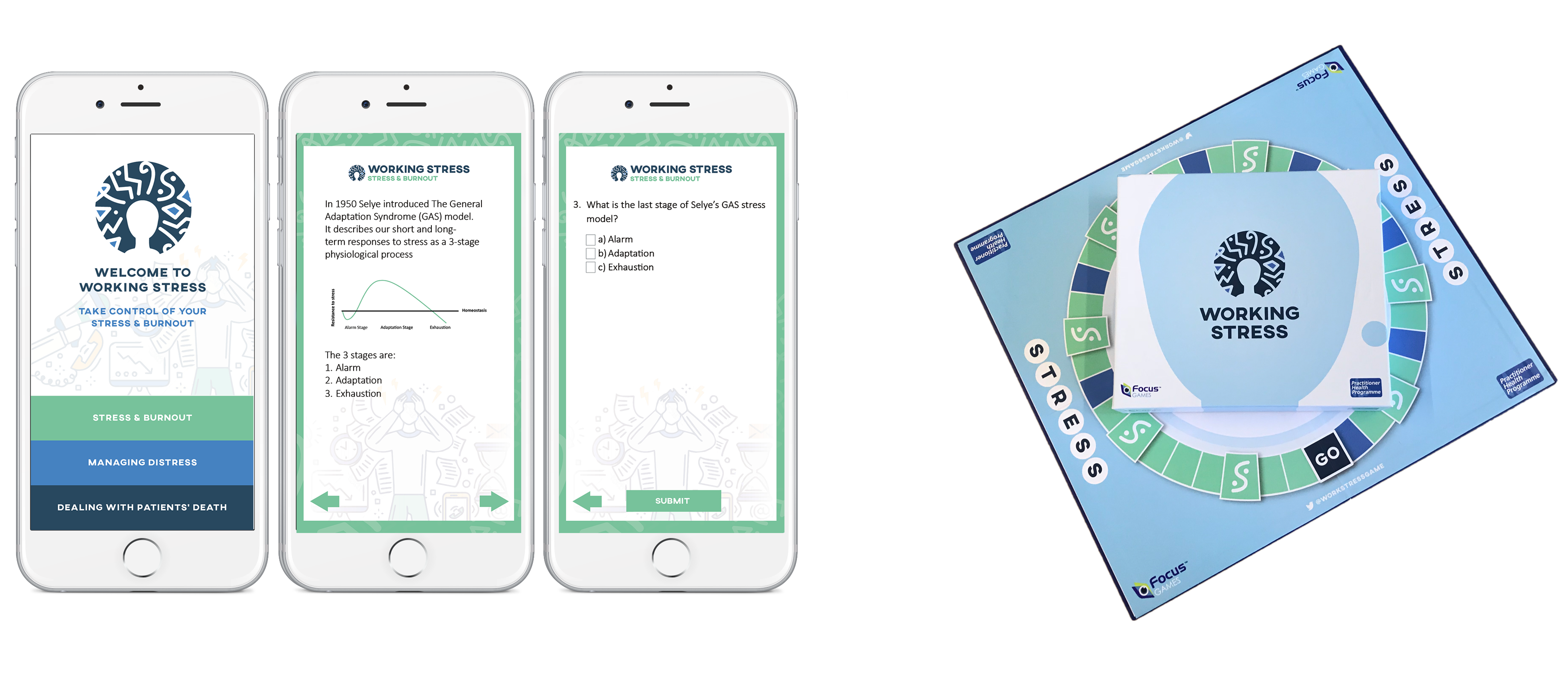
When offered to all clinical staff in a trust, Working StressTM App can reduce the incidence of workplace stress across the whole organisation. It is an effective way to reduce workplace stress and its consequences. Offering Working StressTM to all clinical staff in your organisation is simple:

Purchase required
package

Invite staff to use Working StressTMApp

User creates anonymous account

User completes when
convenient
Working StressTM has been tested by a Randomised Controlled Trial (RCT) with 227 NHS doctors. RCTs are considered to be the ‘gold standard’ of evidence in medicine. We believe that Working StressTM is the only intervention designed specifically for NHS clinical staff and that has an RCT to prove its efficacy. Visit the evidence page to learn more.
The Randomised Control Trial (RCT) Occupational Distress in Doctors: The Effect of an Induction Programme was carried out in 2016/17 by Medisauskaite and Kamau. Visit the evidence page to learn more.
Working StressTM is a collaborative effort between academics, psychologists, clinicians and a leading ‘serious’ games developer. The core development team is:
- Dr Caroline Kamau is an academic who specialises in research about occupationally preparing medical doctors, nurses and patients. She lectures at Birkbeck, University of London. She has published in journals such as Lancet Psychiatry, BMJ Supportive and Palliative Care, the Journal of the Royal Society of Medicine, and the Archives of Environmental and Occupational Health. Her research has been well received, e.g. receiving coverage in the Times, BMA news, and NHS staff bulletins. She has authored a book and has a new book forthcoming. She is a Fellow of the Royal Society of Medicine.
- Asta Medisauskaite is a researcher at UCL’s Medical School in the Research Department of Medical Education. She has published in journals such as the British Journal of General Practice and Psycho-Oncology. Asta and Dr. Kamau’s article about the occupational health of oncologists (a systematic review and meta-analysis) received media attention e.g. The Guardian and is ranked by Altmetric in the top 5% of over 7 million publications worldwide in terms of public impact.
- NHS Practitioner Health Programme (PHP) is specialist, confidential service which addresses the health needs of individuals (doctors and other healthcare professionals), providing assessment, treatment and case management for mental health and substance misuse issues. It has more than 10 years’ experience in this field and offers a self-referral service to around 85,000 doctors across England.
- Focus Games Ltd have been creating innovative educational resources for frontline NHS staff since 2004.
No. Working StressTM was designed specifically to be convenient and simple to use. It only takes 15 minutes to complete Working StressTM and you only need to do it once. It is an HTML5 web app that will work on any device, including smartphones, and can be completed whenever and wherever is convenient for the individual. We know that clinical practice is already very stressful, so Working StressTM has been designed specifically with convenience in mind.
No. Working StressTM is based on widely recognised academic research and cognitive frameworks. It is intended to help clinicians avoid the negative effects of stress but it can also reduce existing symptoms of occupational distress. Working StressTM teaches clinicians how to view and cope with stress in a more positive way. The Transactional Stress Model (Lazarus 1990) proposes that an individual’s response to stress is based on two appraisals. The first establishes how stressful, threatening and controllable they expect a situation to be. The second reviews the resources they feel are available to cope with the situation. The combination of these appraisals and coping strategies act as mediators between stress and its effect on the individual and their ability to deal with the stress.
Working StressTM targets an individual’s cognitive appraisal of stressors and improves their ability to cope with them. It does this by providing specific information about work-related stress, grief and burnout and the impact they can have psychologically and physically. It then presents a range of evidence-based coping strategies that clinicians can apply in daily working life. Working StressTM enables clinicians to view work-related stressors more positively and cope with them more effectively. This results in better psychological, physical and organisational outcomes (Lazarus & Folkman, 1987). It also offers the opportunity for users to reflect on their own experiences.
Working StressTM app is designed to make this learning process short and effective. Working StressTM requires just 15 minutes of an individual’s time to deliver the knowledge and skills needed to appraise stress more positively and cope with it more effectively.
The Working StressTM app contains 3 modules:
- Understanding Stress & Burnout
- Managing Stress & Burnout
- Dealing with Patients’ Death